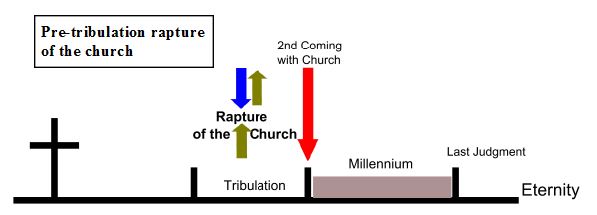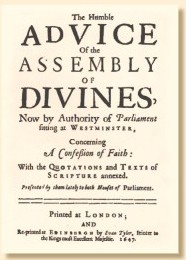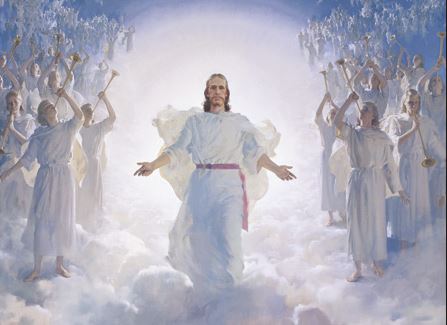 Related Articles
Related Articles
|
|
|
 Websites
Websites
|
|
|
|
|
Covenant Theology and Dispensationalism
Two contradictory and competing 'systematic theologies' have been, and remain very influential in shaping Christian belief and action.
 Note: The 'response' facility relating to this article is available to (logged on) site members only. Note: The 'response' facility relating to this article is available to (logged on) site members only.
Preface
The following article is a modified extract from an earlier article entitled 'A Covenant-keeping God'. The latter, which contains an overview of the major Biblical covenants, is itself part of a 'Drilling Down' series of articles (a 'work in progress').
-----------------------
Foreword:
Theological constructs;
frameworks of interpretation
(aka Systematic Theology)
REGARDING interpretational systems and frameworks or – to use the fancy term – hermeneutics, it is important to note the distinction between terms which are ‘theological’ and those which are ‘biblical’. Theological terms need to be treated with great caution.
Whilst they might be convenient in the discussion of key biblical themes and concepts (e.g. the term ‘Trinity’ as used in reference to the triune Godhead) these are essentially – in the grand sweep of history – neologisms.
They are essentially religious rather than biblical terms or, to use another word, ‘inventions’. They are often lacking clear definition and, across the Christian spectrum, experience differing levels of (dis)agreement and common understanding.
An example is the word ‘sacrament’. It is not found in the Bible and theologians have differed regarding the precise nature of a ‘sacrament’ and also what is (and isn’t ) covered by the term. (See New World Encyclopedia on the subject.) And the different opinions are not confined to the clichéd Roman Catholic/Protestant divisions. The Reformers Luther and Zwingli were famously in disagreement over Communion.
It is also important to differentiate between inductive learning and deductive reasoning. The former derives a view directly from (out of and formed by) the Bible text (exegesis): the latter is arrived at by a process of logic. For instance (and only for the sake of illustration) if it is held that God predestines some to salvation, then logic should dictate that God must, by extension, predestine some to a lost eternity. The use of logic can produce doctrines that are arrived at by eisegesis (reading into a Bible text from a particular and pre-suppositional theological framework).
Clever murder mysteries use 'deduction' to lead the reader or viewer on a false trail and to suspect the wrong person of the crime. (But of course Hercule Poirot's incisive and 'out-of-the-box' thinking shames the logic of we armchair sleuths every time.)
This is not to detract from the benefits of Systematic Theology which (in plainer language) is merely a themed approach to Bible study, but rather to highlight that theological suppositions should never be placed on a par with or, infinitely worse still, sit above the Word of God.
------------
Introduction
Two major theological systems -
(which contradict each other whilst also failing the Berean test: Acts 17:10-11).
 Caveat: Whilst focussing on particular interpretations, this is an 'equal opportunities' document in that it offers scope for upset right across the theological spectrum. Caveat: Whilst focussing on particular interpretations, this is an 'equal opportunities' document in that it offers scope for upset right across the theological spectrum.
In the Christian community across the world there are a variety of theological positions. However two of these have gained widespread support and – whilst disagreeing with one another – have both been highly influential in the formulation of belief. And it is important to stress again that these are theological constructs. The earliest of the two has been termed ‘Covenant Theology’ (mainly formulated and codified in the 17th century; see Footnote): the other being ‘Dispensationalism’ (with its origins in the 19th century).
The former is a central plank within Presbyterian churches around the world and across the (Presbyterian) denominational spectrum. The latter originated in the UK (pioneered by those within what became the Plymouth Brethren), but crossed the Atlantic to become hugely influential in the late 19th century. Dispensationalism informed the belief of the pentecostal churches at the start of the 20th century and has, since then, expanded both denominationally and geographically.
Covenant Theology

Covenant Theology (CT) developed two principal terms to describe its dual covenant interpretational framework viz. a Covenant of Works and a Covenant of Grace. (Some argue that there is only one covenant – the Covenant of Grace. Others include a Covenant of Redemption between the Father and the Son.) These theological terms have been employed to develop a whole range of doctrines and, because of the influence that they have had, we will (d.v.) come back to these later in more detail.
However, for the moment and with reference to the most common 'dual-covenant' view – developed first by Dudley Fenner, an English Puritan, in 1585; and then Scottish theologian Robert Rollock (1555 - 1598) – it is sufficient to say that the (theological) Covenant of Works is used to denote the period prior to the Fall in the Garden of Eden. In simple terms the Covenant of Works would say: “If Adam and Eve had obeyed the instructions given to them then they would have been OK. “ However Adam and Eve didn’t, so God had to embark on Plan B – the Covenant of Grace.”
This term – again simply speaking, but remembering that it is a theological expression, not a biblical, one – covers the continuous period from the Fall until the final consummation and Kingdom come.
However this span of time is (it is argued) split into two ‘administrations’ (again a non-biblical term); basically delineated by the Old Testament (OT) and the New Testament (NT) periods. In these two ‘administrations’ (it is said) God applied the same principles but in two different situations and in two different ways to the one people of God. These were Israelites in the OT and believers (Gentile and Jewish) in NT times.
Whilst this is a convenient hermeneutic, it is not biblical. The nation of Israel was in effect a theocracy within which some were in communion with God (cf Heb. 11) while others were very obviously not. In contrast the church (in the true sense of the bride of Christ) comprises solely of people in blood-bought communion with God.
So 'OT Israel = OT expression of church' is both overly-simplistic and grossly misleading . As a corollary, 'Church = Israel' is also untrue. (More on this below.) But as Covenant Theology has been widely accepted as ‘biblical’ it has led directly to (for instance) infant baptism. Accordingly paedobaptism is claimed to be the NT equivalent of circumcision – even though circumcision was never the symbol of salvation and union with God; and was only ever applied to males. [Again, more on this at later date (d.v.) when looking at 'Who are Abraham's seed?']
One of the other principal, and even more serious, mistakes deriving from Covenant Theology has led to what is commonly called ‘Replacement Theology’. This ‘theology’ – also termed Supercessionism – teaches that the Jews have now been ‘replaced’ by the mainly-Gentile church and (therefore, by deduction and logic) the promises to the Jews have now either all been fulfilled or spiritualised;or will find any contemporary or future fulfillment in the church. (So for instance many older Bibles have chapter headings for Isaiah 59 as “God’s curses on the Jews” and Isaiah 60 as “God’s blessings on the Church”.)
The ‘replacement’ view is most emphatically rejected by Paul in his letter to the (Jewish and Gentile) church at Rome. In fact this is his core message (Rom 11:1-2; 11-12) and the underlying reason for writing this – his longest – letter.
Dispensationalism

In contrast to Covenant Theology the other system of interpretation that has attracted widespread support is that of Dispensationalism.
There is a view that Dispensationalism (as distinct from, but embracing pre-millennialism) has its genesis in a Scottish believer (Margaret Macdonald; 1815-1840) and a Church of Scotland minister (Rev. Edward Irving; 1792-1834). What is undisputed is the fact the John Nelson Darby (founder of the Plymouth Brethren as a distinct grouping with its roots in the wider Brethren movement) is the latter-day father of this theological system. Darby took his pre-tribulation rapture teachings (the removal of believers from the earth prior to the return of Christ and before the ‘great tribulation’ of Matt. 24) to America where they were enthusiastically embraced by a lawyer called Cyrus I. Scofield (1843-1921).
Scofield in turn produced the Scofield Reference Bible (first published 1909) which is annotated throughout in support of Darby’s interpretations – especially with reference to eschatology, the end-time prophecies and events regarding Christ’s return. The Scofield Bible has been hugely influential right through to the present day – in America and right around the world. The teachings are now being propagated through the Moody Bible Institute in Chicago, Dallas Theological Seminary, and more than 200 other lesser-known Bible institutes..
Dispensationalism divides history into sections, covering the periods of Innocence, Conscience, Civil Government, the Patriarchs, the Law, Grace (the church age), the Millennium and the final consummation leading to the everlasting kingdom. However, and perhaps because this theological system lacks biblical warrant, there is a range of opinions (disagreement) on how many dispensations there are (varying from three to eight) and where, in history and in Scripture, the dividing lines lie.
But irrespective of the number of dispensations, the agreed assumption is that God has dealt differently with his world and its people in each of these different dispensations. Accordingly then a different hermeneutic needs to be applied to the different portions of Scripture which cover these different periods of time.
What is also generally agreed is that the church age is a parenthesis – a defined interlude – in God’s overall plan of salvation i.e. in the OT is God dealing through the Jews while the NT is the time of the Gentile church until Jesus’s rapture of the saints (with a pre/post/mid-Tribulation rapture range of views) . This will usher in a further period of God again dealing with and through the Jews.
Dispensational teaching has been greatly popularised and adopted through hugely-influential and best-selling books like Hal Lindsey’s ‘The Late Great Planet Earth’ (1970) and the ‘Left Behind’ series of novels by Tim LaHaye. The Left Behind books – the first in the series appeared in 1995 – have sold over 50 million copies, and have been turned into a cinema production. The books are freely available from and often prominently displayed in Christian bookshops.
As stated earlier, the core element of these novels is the ‘pre-tribulation rapture’ which, as already stated, teaches that all Christians will be suddenly and without any warning removed from the earth prior to the return of Christ. (See Footnotes.) However, and apart from the wider Christian community, even within the Brethren camp there was disagreement. George Mueller (of Bristol Orphanage fame) broke with Darby over this issue. The great Baptist preacher C.H. Spurgeon also declared the teaching to be unscriptural. Nevertheless the doctrine has persisted.
In summation...
Both Covenant Theology and Dispensationalism have been and continue to be highly influential in formulating Christian belief, but both are disputed.
Covenant Theology dismisses swathes of end-time prophecy as irrelevant or allegorical, and sees no place in God’s final purposes for the Jews other than (perhaps) a final ingathering as outlined in Romans. In terms of latter-day expectations prior to the return of Jesus, the former implicitly teaches a universally positive response to the Gospel (reading more into Matt. 24:14 than the verse allows; cf Matt 7:14).
Meanwhile, though recognising the prophesied 'time of great trouble' (Dan 12:1; Matt 24; 2 Tim. 3:1-12), Dispensationalism (in pre-tribulation rapture form), teaches that believers will be spirited away, leaving the Jews to face the music of Satan’s final onslaught. (See Footnotes.)
So while the Gentile believers look down from a safe vantage point in heaven (as God's 'heavenly people'), the Jews will be God's latter-day 'earthly people' who will suffer greatly but endure through the Great Tribulation. Within the Dispensationalist view, Matthew 24 (et al) and, for some, Revelation chapters 4 - 19 are seen as only of academic interest – given the belief that the Gentile saints will be in heaven during that period.
Regarding God’s end-time purposes for the Jews, Dispensational Theology cannot get the church and Israel together, whereas Covenant Theology cannot get the church and Israel apart. The former sees the Jews and the church as totally different entities separated by ethnicity and end-time progression, whereas the latter see Israel and the Jews as essentially an earlier expression of the church, differentiated only by two separate and distinct ‘administrations’ of time (OT/NT) in God’s grace. In fact Israel was/is a physical nation comprising the saved and the lost (Rom 9:7), whereas followers of Christ are a spiritual nation made up exclusively of the redeemed (Gal 3:7,8; 1 Pet 2:9).
At the very least it can be confidently stated that because these two systems disagree markedly with one another, they cannot both be completely right. (And it could be argued that in critical issues they are both wrong.) Yet both of these systems have created expectations and assumptions which could leave believers scripturally askew; vulnerable through false hopes; and ill-prepared to understand the times and the purposes of God in our day as the cosmic upheavals preceding Kingdom Come drawn ever nearer.
At the risk of vain repetition, the theological systems of Covenant Theology and Dispensationalism lack Biblical support in major areas of doctrine, theology and eschatology. Moreover they profoundly disagree with each other on very significant points – especially concerning the times preceding the coming again of Christ; the place of, and God’s purposes for the Jewish people; and the establishment of His everlasting kingdom.
Footnotes:
1. Pre-Tribulation Rapture of the church as taught by most Dispensationalists. The view held is that Christ will have two comings: the first will be invisible 'for the saints' and the second 'with the saints'.

-------------------
 2. The Westminister Confession of Faith (1644) codifies much of what is described as 'Calvinism' and is subscribed to as a 'Subordinate Standard' by Presbyterian denominations worldwide. 2. The Westminister Confession of Faith (1644) codifies much of what is described as 'Calvinism' and is subscribed to as a 'Subordinate Standard' by Presbyterian denominations worldwide.
The document is predicated on so-called 'Covenant Theology' and contains material which is, in the broad sweep of the formulation Biblical, extra-biblical, and unbiblical representing Truth mixed with error.
It is also deficient in failing to cover some some major biblical themes: making bare mention of the person and role of the Holy Spirit, and with no mention of the Great Commission.
3. The Millennium
 Broadly speaking Reformed (Covenant) theology teaches the Millennium as being a definite period prior to the coming again of Christ at the end of the age. However, the early church believed in a literal Millennial reign of Christ on earth. Broadly speaking Reformed (Covenant) theology teaches the Millennium as being a definite period prior to the coming again of Christ at the end of the age. However, the early church believed in a literal Millennial reign of Christ on earth.
While many today share this view, not all who do are Dispensationlists (i.e. all Dispensationlists are pre-millennial but not all Pre-Millennialists adhere to Dispensationalism). See article The (Coming) Millennium by a Scottish lay preacher and city mission superintendent. |
The Editor, 30/07/2013
|
(page
1
2
3
4
5
6
7
8
9
10
11
12
13)
| |
|
Dale (Guest) |
01/08/2013 11:31 |
Colin, Sure we are fortunate in this internet age to have a wealth of information literally at our fingertips.I am also aware that men can get things wrong - even Luther and Calvin were not always correct about everything. We have to be convinced in our own minds what is right according to our own understanding. That is why I am reticent about using 'tags' such as Reformed, Calvinistic, etc. There are various shades of opinion even within these systems of theology. With most people their journeys through the Spiritual life take them through different stages - many change their theological outlook as they grow. Although I attend a church that is Reformed, Calvinistic and beleives in Covenant theology, I have serious concerns about some of these teachings. Sometimes you have to pick out truth from the error, and pray that God will give discernment. I also cannot see in Scripture a secret 'rapture' as some do. But then again we don't want to digress from the present topic!
|
| |
|
John Miller |
01/08/2013 12:29 |
Dale I do not think that the resurrection and translation of all believers who have died together with a change to glorified bodies for them and those who are still alive on the earth will be secret.
The Lord's assembling shout, the sound of God's trumpet blast and the Archangel's voice will be heard by the whole world. Nothing in scripture denies this. The resulting graves, torn open by Christ's almighty power will be a mute testimony to an awesome, inexplicable event. It will be accompanied by unimaginable and humanly speaking tragic events. For example Chistians at the controls of all kinds of vehicles will have disappeared. Surgeons performing delicate operations will be gone from their stations "in the twinkling of an eye", the words of scripture, not my imagination!
The actual resurrection, bodily change and translation up into the air to meet Christ will be a secret, but only because of its incredible speed.
Read Paul's account in 1 Thessalonians ch.4. It does not speak of Christ's return to the earth. This is not the second coming of Christ. That event is spoken of in many scriptures, some from the dawn of time (e.g. Enoch, the seventh from Adam). They all tell us of His return TO THE EARTH. Even the exact spot upon which His feet will land is described in Zechariah.
I ask you what I have asked Colin. To what does Paul refer in 1 Thess. Ch.4 and is it the same event of which he writes in 1 Cor. Ch.16?
Your brother in Christ.
|
| |
|
Covenanter 1 (Guest) |
01/08/2013 12:34 |
Quote John Miller " Colin how do you understand the coming event that Paul describes in 1 Thess.4, and do you believe it is the same event described in 1.Cor.16"?
Think you meant 1st Cor.15.. John.
|
| |
|
John Miller |
01/08/2013 13:27 |
Thanks Covenanter 1. My mistake.
|
| |
|
Colin Ford |
01/08/2013 23:00 |
John,Dale,Editor, and who ever else may be interested.
It is my understanding of the knowledge that I have gleaned thus far of my personal study of God's Word that 1 Thessalonians 4.16-17, 1 Corinthians 15.52 and Matthew 24.31 to be ONE and the SAME event.
This is "The blessed hope" Titus 2.13, and He is the ONE who shall come according to Hebrews 9.28.
Where in these Scriptures do we learn that the Saviour is coming back twice? This teaching of two comings is NOT Scriptural, the Word of God does NOT teach it.
John is correct when he asserts that there is nothing "secret" about the Lord's Second Coming. If we are to understand these things aright; the so-called "rapture" Scripture in 1 Thessalonians 4.16-17 is anything but silent! Also these particular Scriptures speak of the "trump of God". This "trump" is the last trumpet of Revelation 11.15. This IS (without Dispensational hermeneutics; the plain teaching of Scripture?)
Of course, there are many wise, intelligent and Biblically 'knowledgeable' men that will teach that the last trumpet is "not really the last trumpet"! They have to speak this way to remain faithful to Dispensational theology! (Which is NOT Biblical-It is a theory, invented by men).
John, have you ever read Arthur Pink's "Redeemer's Return"? From your description of the "rapture", it would appear that you have! I am sure that Messr's La Haye and Hal Lidsey were inspired by his teachings! Though I have no direct proof.
|
| |
|
Colin Ford |
01/08/2013 23:36 |
Dale,
I can assure you that I share your "reticence" regarding using these "tags" as you call them! I didn't invent them! But we must ever remember that without them, we may not understand what others believe, or where they are coming from?
You see; when I came to faith (2001), I believed that I found God, subsequently I now know that he "found me"! To cut a very long story short you will probably understand why I am a "Calvinist"? Now, Calvinism per se, saves no one, ONLY the blood of Christ does that? John 14.6, Acts 4.12 etc.
Then I came to be part of the so-called "free grace" movement which literally teach we can do what we like; in fact even reject God (as long as we ONCE believed in Him) and yet still be assured of our salvation.
I do agree with the "basic tenets" of Reformed Theology, Protestantism, Calvinism, Holiness, etc, but NOT the traditional eschatology, or millennial teaching associated with such.
Regarding your last sentence; "We don't want to digress from the present topic!"
Without realising it, you HAVE hit the nail on it's head! The rapture (any moment/secret/imminent, call it what you will) CANNOT be separated from our present topic. It is inextricably linked to Dispensational theology, this pre trib rapture doctrine is the zenith of Dispensational theology, it is it's crowning achievement!
|
| |
|
John Miller |
02/08/2013 10:06 |
Colin please bear with me and answer another question. You have equated the Lord's words in Matt.24:31, describing a future event, i.e. His second coming, with Paul's detailed description in the verses in 1 Thess. 4 and 1 Cor. 15.
Those to whom The Lord spoke at that time (Matt.24) were exclusively Jewish. The Lord goes on in His address to that audience to prophesy events particular to the Jewish nation. There is no mention of resurrection, rather a gathering together from every pat of the world.
I Paul's prophesy to the churches in Thesalonica and Corinth he was not addressing a Jewish audience although there would certainly have been Jews present who had embraced the Christian Gospel of salvation through faith rather than obedience to the Mosaic Law. Paul was addressing the churches in these cities and by extension every Christian believer in every church.
These prophetic revelations, first by Jesus and then by Paul were addressed to two very disparate audiences with particular references to their respective future circumstances.
When do you think that "the dead in Christ" will be raised?
|
| |
|
Editor |
02/08/2013 11:09 |
Without wishing to intrude in this interesting discussion, but just to say that Matt 24 is a two-part ('twin-peaks') prophecy with both 1st-century and last-days fulfillments. The first part was - as John rightly states - principally to a Jewish audience. However the second outworking is to the whole world. Verse 31 is set in a global context with unmistakeable phenomena (cf Matt 24:29) which are unmissable, highly-dramatic and universal.
No one knows the 'day and hour' but Jesus and the prophetic scriptures plainly spell out the 'seasons' and the 'birth pangs'.
|
| |
|
Dale (Guest) |
02/08/2013 14:18 |
Matthew 24 has always been a difficult chapter. I think that Editor is right when he says that the chapter is 'two-part'. I have always considered it both preterist and futurist, however if or where the line of demarcation occurs is not clear. Some (e.g. J.Marcellus Kik) have made the verses 1-35 preterist as what happend during AD70, and 36 onwards is the 2nd coming of Christ. Others make verse 29 the change. The writings of Josephus about the events of AD70, evidently fit in very well with the first part of Matt 24. Jesus continues in Matt 25, very clearly the 2nd advent.
|
| |
|
Seumas (Guest) |
02/08/2013 16:16 |
Natthew 24:9 is presumably metaphorical:
“Immediately after the distress of those days “ ‘the sun will be darkened, and the moon will not give its light; the stars will fall from the sky, and the heavenly bodies will be shaken"
The moon doesn't give light - it is a reflector of the suns light. So if the Sun stops giving light, so does the moon.
Stars cannot "fall" - they are not held up against gravity. Shooting stars aren't stars at all but interplanetary debris that burns in the atmosphere.
It must be metaphorical. It cant be literal.
|
(page
1
2
3
4
5
6
7
8
9
10
11
12
13)
|
|
|